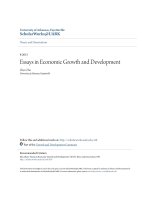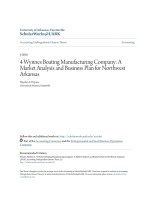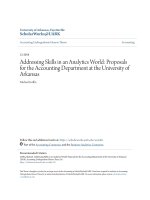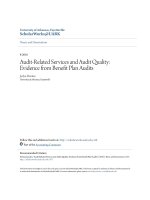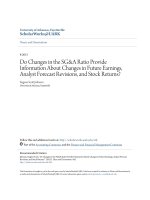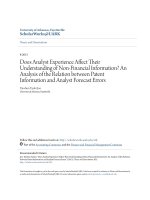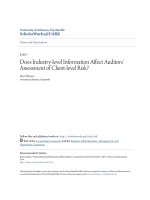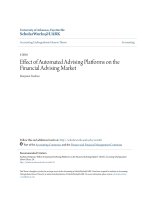Accounting undergraduate Honors theses: History and analysis of the fayetteville, Arkansas human civil rights ordinance
Bạn đang xem bản rút gọn của tài liệu. Xem và tải ngay bản đầy đủ của tài liệu tại đây (11.44 MB, 114 trang )
University of Arkansas, Fayetteville
ScholarWorks@UARK
Accounting Undergraduate Honors Theses
Accounting
5-2016
History and Analysis of the Fayetteville, Arkansas
Human Civil Rights Ordinance
Michaela E. Pecoraro
University of Arkansas, Fayetteville
Follow this and additional works at: />Part of the Civil Rights and Discrimination Commons, Law and Gender Commons, Sexuality
and the Law Commons, and the State and Local Government Law Commons
Recommended Citation
Pecoraro, Michaela E., "History and Analysis of the Fayetteville, Arkansas Human Civil Rights Ordinance" (2016). Accounting
Undergraduate Honors Theses. 21.
/>
This Thesis is brought to you for free and open access by the Accounting at ScholarWorks@UARK. It has been accepted for inclusion in Accounting
Undergraduate Honors Theses by an authorized administrator of ScholarWorks@UARK. For more information, please contact ,
History and Analysis of the Fayetteville, Arkansas Human Civil Rights Ordinance
Michaela E. Pecoraro
Sam M. Walton College of Business
University of Arkansas
Advised by: Dr. John M. Norwood
An Honors Thesis in partial fulfillment of the requirements for the degree Bachelor of Science in
Business Administration in Accounting.
Sam M. Walton College of Business
University of Arkansas
Fayetteville, Arkansas
April 2016
1
Table of Contents
INTRODUCTION
3
PART ONE: THE RISE OF ANTI-DISCRIMINATION LAW IN FAYETTEVILLE
PROJECT ONE AMERICA
ANALYSIS AND PASSAGE OF ORDINANCE 5703 AND CHAPTER 119
ROAD TO THE VOTE: RESPONSE, PUBLIC OPINION AND REFERENDUM
IMPACT
5
6
9
14
PART TWO: THE UNIFORM CIVIL RIGHTS PROTECTION ORDINANCE
THE NEED FOR A FAYETTEVILLE CIVIL RIGHTS PROTECTION ORDINANCE
THE UNIFORM CIVIL RIGHTS PROTECTION ORDINANCE
TIMELINE
ELECTION RESULTS
16
17
21
24
PART THREE: LEGALITY IN QUESTION
THE LAWSUIT
THE INTRASTATE COMMERCE IMPROVEMENT ACT
RULINGS
26
29
30
CONCLUSION AND ANALYSIS
35
REFERENCES
37
APPENDIX DOCUMENTS
41
41
46
48
52
58
84
94
100
112!
APPENDIX A
APPENDIX B
APPENDIX C
APPENDIX D
APPENDIX E
APPENDIX F
APPENDIX G
APPENDIX H
APPENDIX I
2
INTRODUCTION
“The end of law is not to abolish or restrain, but to preserve and enlarge freedom. For in all the
states of created beings capable of law, where there is no law, there is no freedom.”
-John Locke
Since its formation nearly 250 years ago, the United States has established itself as a beacon
of opportunity for individuals from all backgrounds. This opportunity has resulted in the
development of the United States as one of the most diverse countries in the world, with the interests
of these many individuals manifesting itself in a healthy and open economic environment.
Despite this diversity, over its history the U.S. has faced numerous hurdles when it has come
to civil rights and the legal definition and scope of individual liberties. These battles have often been
fought on a regional and state-by-state level, including: division of Confederacy and Union states
over the status of slavery and the legal definition of African American citizenship in the mid-19th
Century; women’s suffrage movement, rooted primarily in Northeastern United States, in the early
20th century; and African American Civil Rights movement born out of the prejudicial and racist
legal environment in the southeastern U.S. in the 1960s and 1970s.
With each advancement in individual rights of one demographic group, the landscape of
others’ rights is further examined— often the result of a modernizing society that experiences a
maturation of social views. The most recent demographic group to experience this change and
incremental progression of rights is Lesbian, Gay, Bisexual, and Transgender (LGBT) individuals
and unionized couples- representing 9.5 million Americans. (Williams Institute, 2015). This includes
the Supreme Court legalizing gay marriage nationwide in June of 2015 by a vote of 5-4. (New York
Times, 2015). This groundbreaking ruling has been accompanied by an overarching shift in society’s
acceptance of the LGBT community. The approval rate of same-sex marriage has more than doubled
3
in the last twenty years, reaching an all time high of 60%. (Gallup, 2015). In a Pew Research Center
study, 92% of LGBT adults felt that society has grown more accepting and welcoming over the past
decade. (Pew Research Center, 2015).
Despite the evolving legal and societal changes in the LGBT movement, there continues to
be numerous instances of increase in LGBT discrimination- particularly in the areas of employment,
housing, and public accommodations. Nearly two-thirds of LGBT Americans have reported
circumstances in which they felt discriminated against. (Human Rights Campaign, 2015). As it
stands, the federal government has no clear-cut nondiscrimination protections based on sexual
orientation and gender identity, thus leaving the responsibility to the states. Many states have already
adopted nondiscrimination laws protecting residents from these forms of discrimination and
following the Supreme Courts same-sex marriage ruling, many other states and municipalities have
followed suit. In total, seventeen states and the District of Colombia and more than 200
municipalities have adopted such non-discrimination ordinances. (Freedom for All Americans,
2016). This wave of legislation has occurred in our own city, Fayetteville, Arkansas, as defined by
the Uniform Civil Rights Protection Act, or Ordinance 5781, where discrimination is prohibited on
the basis of sexual orientation or gender identity in employment, public accommodations, property
transactions, and contractual agreements. However, this was not the first draft of a nondiscrimination
ordinance and the legality of Fayetteville’s ordinance is in question.
There still remains a solid—albeit diminishing— opposition of the LGBT movement and the
legalization of gay marriage has fueled the controversy. LGBT nondiscrimination ordinances
throughout the country have been largely controversial and in many cases are repealed through
elections or lawsuits. In cases where ordinances are approved, many states have begun to take action
on LGBT rights by superseding cities’ and local municipalities’ through legislation. This study is an
in-depth analysis of the City of Fayetteville, Arkansas’ controversial road to anti-discrimination
legislation for the LGBT community.
4
PART ONE: THE RISE OF ANTI-DISCRIMINATION LAW IN FAYETTEVILLE
Project One America
According to a survey conducted by the Williams Institute, an estimated 35% of the country’s
LGBT community lives in the South, with an estimated 79,000 adults in the state of Arkansas alone.
(Williams Research Institute, 2016). However, none of these individuals have fundamental civil rights
from discrimination because of their sexuality. Arkansas law has no consistent, state-wide
nondiscrimination protections based on sexual orientation or gender identity. The state is also considered
one of the most underserved states by the national LGBT movement, according to the Human Rights
Campaign, the country’s largest LGBT Civil Rights organization. The group, originally titled the Human
Rights Campaign Fund, was founded in 1980 and was one of the nation’s first political action committees
for gay and lesbian citizens. The organization removed the word “Fund” from its name in 1995 and
shifted focus from lobbying towards promoting inclusion and equality. (Human Rights Campaign, 2016).
In a strong effort to increase equality for the LGBT community in the South, the HRC created a
three-state task-force in Mississippi, Alabama and Arkansas in 2014 called Project One America. The
organization, equipped with an $8.5 million budget for the next three years, began the project with the
intent to reverse the notion that Southern states are the “finish line” for LGBT civil rights. Once the states
were selected, the Human Rights Campaign began an intensive needs-assessment of each. The survey is
the largest survey of its kind in efforts to measure LGBT in Southern societies. A key finding of the
survey show that in each of the states, one quarter of the LGBT community have felt discriminated
against in certain business transactions.
In an individual state assessment, the quantitative survey of 979 LGBT respondents in Arkansas
reported that half had experienced discrimination on the street, 37% reported of harassment at work and
one quarter had experienced employment discrimination. In the workplace, 37% of LGBT workers
responded that they are not publically open with their colleagues in fear that they will not be considered
5
for promotions, advancements, or development opportunities. The discrimination is not just at work—
43% reported to experience discrimination in public establishments; 45% reported having faced
discrimination in school; and 18% reported monthly or more discrimination at various houses of worship.
The survey also found that LGBT citizens are important members of the communities. 58% of the
survey respondents have called Arkansas home for over 20 years; 53% of the LGBT respondents
volunteer in their community; and 60% donate money to charities and non-profit organizations. The
survey also found that 1/3 of respondents were people of faith. (Human Rights Campaign, 2014).
Analysis and Passage of Ordinance 5703 and Chapter 119
Less than two weeks after the Human Rights Campaign’s report was released to the public in July
2014, measures were being taken by local municipalities throughout Arkansas. With no clear and definite
state anti-discrimination laws or protections for the LGBT community, cities and counties throughout the
state began discussions of taking action. On July 15 2014, the Fayetteville City Council introduced and
held the first reading for a potential ordinance that would amend the city’s code to provide protections for
all citizens from ‘unfair discrimination.’ The ordinance, Ordinance 5703, called for the enactment of a
new Chapter into the city code, Chapter 119 – Civil Rights Administration. To see a copy of the proposed
Ordinance 5703 and Chapter 119, see Appendix A.
§ 119.01 - § 119.02 Purpose and Definitions
The purpose of the proposed legislation cited was to “protect and safeguard the right and
opportunity of all persons to be free from discrimination based on real or perceived race, ethnicity,
national origin, age, gender, gender identity, gender expression, familial status, marital status,
socioeconomic background, religion, sexual orientation, disability and veteran status.” The act cites
specific instances such as employment, housing and rental transactions, and public accommodation
6
transactions that should be available to all citizens without discrimination. Additionally, the act was
intended to “promote the public health and welfare” of all individuals who work or live within the city.
Following the purpose of the bill, §119.02 includes relevant definitions of terms used throughout
the ordinance. The definitions given are not a complete set of definitions for the entire ordinance, but
rather a specific selection of terms that may need more interpretation. Some definitions are fairly straight
forward, such as definitions for “Business Establishment,” “Employer,” and “Employee.” However, the
ordinance also includes its intended interpretations for terms without concise and comprehensive
definitions. “Discriminate, Discrimination or Discriminatory,” consists of “any act, policy or practice that
has the effect of subjecting any person to differential treatment” due to a person’s attributes or
characteristic listed in the ordinance. Of those listed attributes and characteristics, definitions are given for
those subject to a variety of interpretations. “Gender” is defined as an individual’s “actual or perceived
sex.” Finally, there are the two definitions for the controversial terms that are seldom used in Arkansas
legal code – gender identity and sexual orientation. The ordinance defines gender identity as “a person’s
gender-related identity, whether or not that identity is or is perceived to be different from that traditionally
associated with the sex assigned to that individual at birth.” Sexual orientation is defined as “actual or
perceived heterosexuality, homosexuality or bisexuality.” See Appendix A.
§ 119.03 to § 119.06 Prohibited Acts of Discrimination
The ordinance lists a number of discriminatory actions that would be considered unlawful for an
employer or labor organization to conduct, completely or partially, throughout employment procedures
for a “discriminatory reason.” Such acts include the failure or refusal to hire and the firing of employees;
discrimination in relation to ‘compensation, terms, conditions or privileges or employment,’ including
promotions; to discriminate against an individual’s “admission to, or employment in,” any training or
apprentice program; to print or publish discriminatory notices or advertisements; and to make
discriminatory referrals regarding an individual in the employment process. Also, the ordinance bans
actions that would deprive an individual of employment opportunities, limit potential employment
7
opportunities and or in any way result in an adverse affect for the prospective employee’s application.
The ordinance then lists a number of discriminatory actions that would be considered unlawful if
conducted by parties within housing and real estate transactions. This subsection includes actions taken
throughout the sale and lease transactions for a reason that is either partially or entirely discriminatory.
Such acts include discrimination in the form of “impeding, delaying, discouraging, or.. limiting or
restricting transaction in real estate;” “imposing different terms on real estate transactions;” and to give
the perception that “an interest in real estate is not available for transactions” due to a discriminatory
reason.
Finally, the ordinance declares that for all business establishments and accommodations that are
intended for public use, it is illegal to disallow “directly or indirectly, any person the full enjoyment of the
goods, services and facilities, privileges, advantages and accommodations” due to discriminatory reasons.
This is the sole section of the bill that makes it illegal to refuse service for discriminatory purposes. The
ordinance is binding on the City of Fayetteville and its employees; city government, employees and
contractors conducting business with the municipality are held to the same standard as individuals and
businesses. After its introduction, the ordinance was amended to include a general exemption for religious
beliefs after there was public backlash from local religious institutions. (Fayetteville Flyer, 2014). Also
included in the exemptions are procedures regarding a “bona fide” affirmative action policy and
occupational qualifications. See Appendix A.
§ 119.07 and § 119.11 — General Exemptions and Administration and Enforcement
The ordinance provides exemptions in which individuals and entities may be able to act in a way
that violates Chapter 119 and its provisions. The ordinance states that the chapter does not pertain to any
“federal, state or county government office or officer, or any public educational institution within the
City.” In addition, practices that may ordinarily be deemed by the ordinance as discriminatory may be
exempt if it is an effort to carry out an affirmative action policy by a law. There is also an exemption to
protect the freedom of religion and speech for practices of a “permissible bona fide religious or
8
denominational preference” but that they must demonstrate there is burden of proof that “the
discrimination is in fact a necessary result of such a bona fide condition.”
Complaint procedures, administration and enforcement of the ordinance are stated to be overseen
by the Mayor. In order to carry out each of these functions, the ordinance creates the position of the Civil
Rights Administrator. The position, appointed by the Mayor of the city, would hold the responsibility of
“receiving, investigating, and conciliating complaints filed under [Chapter 119].” As it did not prepare a
mock complaint form, the administrator is to carry out the responsibility for that as well. Complaints must
be received by the administrator’s office no later than six months after the most recent discrimination
offense. Once received, the administrator “should first attempt to eliminate the unlawful practice or
practices through conciliation and meditation.” If an attempted resolution is deemed unsuccessful and the
accused discriminating party was not found to act in “good faith, the complaint may be immediately
referred to the City Prosecutor’s office.” See Appendix A.
1.4 Road to the Vote – Response, Public Opinion, and Referendum
Initial Response
When Ordinance 5703 was introduced during its second reading on the August 5, 2014 city
council meeting, member of the council listened for hours to public feedback. The first reactions to the
ordinance were those in opposition. The primary argument of those against the ordinance was that it
infringed upon their First Amendment rights by prohibiting the freedom to express their religious beliefs
and faith. In response, the council proposed an amendment to the ordinance to provide an exemption for
religious institutions. However, even with the religious exemption, opposition was still strong. Other
arguments claimed that the ordinance was equivalent to “opening a door for pedophiles and sexual
predators.” Some residents questioned whether the discrimination actually existed and asked for specific
examples. A majority of the opposed respondents were leaders of religious organizations, with very few
individuals speaking in favor of the legislation. After hours of discussion, the city council held the
9
ordinance at its second reading until the next City Council meeting. (Fayetteville Flyer, 2014).
Third and Final Reading
In the third and final reading of the ordinance held on August 19th, the expected turnout from
citizens was so high that there was discussion of moving the meeting to a larger location than the planned
venue of City Hall. While the venue change was not approved, the attendance of the meeting left the
chambers at full capacity. The original meeting earlier in the month had had 22 public responses, the
August 19 meeting held in City Hall had 73 statements during its time for public comment. Of these
residents, 49 were in favor of the ordinance and 24 were opposed. (Fayetteville Flyer, 2014).
A number of opponents’ arguments were similar to those heard in the first meeting, such as
allowing predators to enter public bathrooms. Additional arguments were presented that the ordinance
could hurt local business by causing companies to start businesses outside of the city. Many respondents
asked a similar question – where is the discrimination? To this question, a number of people spoke up on
discrimination instances experienced personally or witnessed. One respondent claimed to have lost
employment due to his sexual orientation; another resident spoke of fears that a landlord would evict him
if they learned he was gay. While many agreed that Fayetteville is a “fair-minded place,” there are
“isolated instances of oppression” that warrant city action.
In addition to public comment, several amendments were proposed before the final vote of the
City Council. All tax-exempt institutions and places of worship owned by a religious institution were
voted by aldermen to be exempt from the ordinance. Alderman Justin Tennant proposed an amendment to
allow the citizens to decide the fate of the legislation in a public vote during the upcoming general
election. With opposing opinions regarding this amendment, the council voted 2-6 to reject Alderman
Tennant’s amendment. However, the public would still have the chance to challenge the new law by
issuing a petition to halt the effective date of the ordinance and institute a special election.
After ten hours of discussion and the longest meeting in city council history, the aldermen voted
in a 6-2 vote for the passage of the ordinance. Understanding that there were key disagreements amongst
10
respondents, the law was passed with the anticipation it may need to be amended in order to serve all
citizens. Council members against the ordinance claimed that it was “irresponsible” to enact an ordinance
that was not complete. However, those who voted for the ordinance agreed that discrimination was an
issue to be dealt with urgency, and that it was city council’s responsibility to “take the first step.”
(Fayetteville Flyer, 2014).
Public Sponsors and Advocacy Groups
Proponents of the legislation registered an Arkansas Ballot Question Committee with the
Arkansas Ethics Committee called Keep Fayetteville Fair. The group was established to defend the Civil
Rights Administration Ordinance and to campaign for voters’ ballot in the election. The group advocated
that their supporters are individuals who “believe all folks who work hard, pay their taxes, serve in our
military, and contribute to our community deserve to be treated fairly under law, including our gay and
transgender neighbors.” (Keep Fayetteville Fair, 2014). The advocacy group was funded on donations
from supporters, including the Pulaski County Democratic Committee, the NWA Center for Equality, and
the Human Rights Campaign. The Human Rights Campaign donated money and nonmonetary
contributions totaling $166,080.50 from the organization’s Washington D.C. headquarters. (Henry, 2014).
Opponent activists also registered with the Arkansas Ethics Committee and created a Ballot
Question Committee called Repeal 119. The advocacy group cited that while they are not in favor of
discrimination, they feel that the ordinance “elevates sexual orientation and gender identity” to being a
basic human civil right comparable to race, gender and religion. The group states that the ordinance
actually increases discrimination by giving sexual orientation and gender identity greater protection and
privileges than race, gender and religion. Repeal 119 stated that a vote against the ordinance would:
support the local business community by rejecting excess government regulation; defend citizens’ First
Amendment right to freedom of speech and religion; protect women and children in public places such as
restrooms and locker rooms; and give citizens the right to set their own laws. (Repeal 119, 2014).
11
Special Referendum Election
With City Council’s August 19 approval, Ordinance 5703 was set to go into effect on September
20, 2014. As Alderman Tennant was denied his request to amend the ordinance by suspending the
ordinance’s enactment until the public voted in a special election, opponents had until that date to take
significant action. In order for the opponents to receive the public referendum and special election they
sought, they had until the enactment date to turn in a petition with the needed 4,095 signatures, equal to
fifteen percent of the citizens who voted in the most recent mayoral election. Immediately following the
ordinance’s approval, opponent group Repeal 119 began petitioning for the public referendum and
collecting signatures of citizens who were in favor of a public vote. (Fayetteville Flyer, 2014).
Collected by the City Clerk’s office, Repeal 119 turned in 5,722 signatures on the first count
September 20. The City Clerk’s office had ten days to verify the validity of each signature and to identify
duplicate signatures. By September 29, the Office certified there were adequate signatures on the petition,
thus suspending the enactment of the ordinance until the public voted in a special election. The election
date was approved for December 9, 2014. (Fayetteville Flyer, 2014).
Final Weeks
In the final weeks between the public referendum and the December 9 special election, both
proponents and opponents were making significant measures to educate the public. Local government and
public leaders were also taking action in the debate. On November 6, 2014, the Fayetteville Chamber of
Commerce announced that they were holding a press conference the next day to discuss their Board of
Director’s “unanimously adopted” decision to issue “a resolution calling for the Repeal of Ordinance
5703.” The Chamber’s decision to take a stance on the public debate was made for a number of reasons,
primarily that the ordinance criminalized civil conduct and was vague and incomplete.
In the announcement of the Chamber’s press conference, the Chamber expressed it was “never
good public policy for any governmental entity to adopt rules, regulations, ordinances or laws that are
vague, incomplete, fail to include critical definitions for prohibited acts or conduct that may be later be
12
adjusted as criminal.” In the press conference the following day, the Chamber’s Board of Director’
Chairman, Bill Bradley stated that the purpose was to “announce the plans of an informational campaign
to recommend to their members and the public to repeal Ordinance 5703.” Bradley claimed that the
“exclusive focus of [the Board’s] informational campaign is that the law is seriously flawed as written.”
The Chamber urged voters to vote in favor of the Ordinance’s repeal on December 9. (City of
Fayetteville’s Chamber of Commerce, 2014).
Several actions and statements were made in response to the Chamber of Commerce’s resolution.
Proponent advocacy group Keep Fayetteville Fair issued a statement the day of the conference expressing
disappointment in the Chamber’s decision to take a stance on such a divisive issue. City Council
Alderman Mark Kinion, supporter of the ordinance, stated that he planned to return the $250 endorsement
he received from the Chamber of Commerce for his reelection fund. (Fayetteville Flyer, 2014). On
November 10, University of Arkansas Chancellor G. David Gearhart issued a letter asking the president
and chairman of the Chamber of Commerce to “rescind” its action. Writing as an “ex-officio member of
the Board of Directors” he stated that he was not asked his opinion regarding the Chamber’s resolution.
The Chancellor wrote that the Chamber “should promote harmony and prosperity, not create crisis” and
that the issue has “strained relations among town, gown and individual citizens.” The same day, Mayor
Lioneld Jordan also issued a letter requesting the Chamber to rescind its decision to “oppose and lobby”
against Ordinance 5703. Jordan also stated that he too, as an ex-officio member of the Board, was not
aware nor given any notice of the Chamber’s meeting and decision. To see Chancellor Gearhart and
Mayor Jordan’s statements to the Chamber of Commerce, see Appendix B.
Voting Results
Voters cast their ballots on the special election on December 9, 2014 with a turnout of 29.42% of
registered Fayetteville voters. The Civil Rights Administration Ordinance was repealed by a vote of
51.65% to 48.35%, a nominal difference of 480 votes. (Washington County, 2014). With such a close
margin, many citizens requested a revision of the ordinance to be made. In a statement issued on
13
December 12, City Attorney Kit Williams declared his disappointment with the outcome of the election,
stating that he did not truly believe Fayetteville had a discrimination problem until the “marathon”
campaign for Ordinance 5703. Although he did not believe a revision of the original ordinance would be
best for the city, the city needed a noncomplex ordinance to “place Fayetteville on the side of equality,
justice, love and inclusion.” To see the City Attorney’s statement to City Council, see Appendix C.
Impact – Other Municipalities and State Response
Although it was not upheld by the voters, Ordinance 5703 and the proposed Chapter 119
amendment of the City of Fayetteville code had significant impact in the State of Arkansas. The bill was
one of the first of its kind to protect the interests and civil rights of the LGBT community by prohibiting
discrimination for two new classes in civil rights. It also presented a problem that was seldom advocated
for and scarcely understood in the state. Upon the release of the Human Rights Campaign’s report, local
municipalities began to take action by drafting their own versions of nondiscrimination ordinances.
In the months following Fayetteville’s voter repeal of Ordinance 119, cities and counties
throughout the state moved forward with their own civil rights legislation. In February 2015, the city of
Eureka Springs’ city council voted unanimously to enact Ordinance 2223, which prohibits discrimination
based on “real or perceived race, ethnicity, national origin, age, gender, gender identity, gender
expression, familial status, marital status, socioeconomic background, religion, sexual orientation,
disability or veteran status.” (Eureka Springs, Arkansas, Municipal Code § 7.65). Eureka Springs, quoted
as the “Gay Capitol of the Ozarks,” was the first to offer domestic-partnerships and the first to conduct
marriages of LGBT couples; however, the city did not have the legal means to protect those individuals
until the ordinance was introduced. Based off of Fayetteville’s original legislation, Ordinance 2223
protects all citizens of the city. After city debate, the ordinance was voted on and passed by the citizens
on May 12, 2015. (Northwest Arkansas Democrat Gazette, 2015).
14
The state capitol of Little Rock introduced an anti-discrimination ordinance at the proposal of
City Director, Kathy Webb, and was voted on by the Little Rock City Board on April 21, 2015. The
ordinance is similar to other municipalities’ in that it prohibits discrimination based on sexual orientation
and gender identity; however, its focus centers around workplace and employee discrimination. The
ordinance was passed in a 7-2 vote. (Arkansas Times, 2015). A little over a month later, Pulaski County
took a stance on the issue when it passed its own anti-discrimination ordinance in a vote 10-5 by members
of its Quorum Court on May 26, 2015. Pulaski County, the largest county in Arkansas and home to the
city capitol of Little Rock, was the sixth municipality to enact nondiscrimination legislation for its
citizens. (Human Rights Campaign, 2015).
However, while local municipalities were making great strides towards inclusion and equality of
the LGBT community, the state legislature was making great strides to prevent it. In early 2015, Senator
Ben Hester (R-Cave Springs) sponsored and filed Senate Bill 202, The Intrastate Commerce Improvement
Act with the state senate. The purpose of the bill was to create antidiscrimination legislation that is
“uniform” throughout all levels of government within the state. To achieve this, the bill prohibits any city,
county, or other political municipality to “adopt or enforce an ordinance, resolution, rule or policy that
creates a protected classification or prohibits discrimination on a basis not contained in state law.” On
February 24, the bill was passed by the Arkansas General Assembly and created Act 137 of the Arkansas
Code. (Arkansas 90th General Assembly, 2016). While intended to be a roadblock for further LGBT
nondiscrimination ordinances, the language of the act has created a state wide debate over the intended
interpretation. Until clearly interpreted by the highest level of court, municipalities continued to adopt
ordinances in line with both the law and the needs of their citizens.
15
PART TWO: THE UNIFORM CIVIL RIGHTS PROTECTION ORDINANCE
Introduction – The Need for A Fayetteville Civil Rights Protection Ordinance
Following the public’s veto and repeal of Ordinance 5703, proposals were made for a revised
version within days. On December 12, 2014, just three days after the special election of the original civil
rights ordinance, Fayetteville City Attorney Kit Williams issued a statement and memo to City Council
addressing the city’s next steps. In his memo, titled “The Need For A Fayetteville Civil Rights Protection
Ordinance,” Williams claimed that he felt that a revision of the original ordinance was “ill-advised” and
“would not likely end the divisiveness and bring consensus.” However, the reality of discrimination in
Fayetteville had been exposed and the city attorney felt that he had a duty to the citizens who elected him
to “unite Fayetteville in freedom and fairness.” The forthcomings from the previous legislative process
had made it clear that there was still a need to protect all citizens of Fayetteville, but on its own terms.
Therefore, Kit Williams drafted an entirely new anti-discrimination ordinance to better serve the citizens
of Fayetteville and provide protection to all. To see the City Attorney’s statement to City Council, see
Appendix C.
In his address to the Fayetteville City Council, Williams stated that he intended to create
legislation largely accepted by a majority of voters rather than a small minority. Thus, the proposed
ordinance would be “laser focused” on the true problems that needed to be addressed. In developing such
important and controversial legislation, Williams stated that it would be a mistake to rely upon an
ordinance drafted by a Washington D.C.-based special interest group, the Human Rights Campaign. For
such a sensitive and debated topic, there must be an understanding of the state and city’s history, law and
composition, as well as the utmost concern for all of Fayetteville’s citizens.
In doing so, the City Attorney derived a significant portion of the context from the Arkansas Civil
Rights Act of 1993 (ARCA), which after two decades of application and history, is looked to for guidance
throughout the state when issues of discrimination must be confronted. Specifically, Williams included
exact definitions of “Employee”, “Employer”, “Religion”, and “Place of public resort, accommodation,
16
assemblage, or amusement” from the A.C.R.A. He also narrowed the scope of the proposed ordinance by
integrating the §16-123-103 Applicability, § 16-123-107 Discrimination Offenses, and § 16-123-108
Retaliation statutes from the Arkansas Code. The ACRA provides discrimination protections on the basis
of “race, ethnicity, national origin, age, sex, religion and disability.” Because there are no protections
from discrimination towards gender identity and sexual orientation in the ACRA, Williams referenced
applicable and relevant laws throughout the courts in which transgender individuals have been granted
protection, such as Price Waterhouse v. Hopkins, 490 U.S. 228 (1989).
While it was noted that a completely new ordinance would not automatically bring a consensus
amongst differing viewpoints, a “shorter, more focused, and clearer” ordinance would give citizens a
better understanding of where they stood. Instead of broad definitions, offenses, and applications to
interpret, citizens would be able to reference a carefully constructed ordinance, tailored specifically for
Fayetteville’s actual problem. In order to have a better understanding of what that problem is, what form
it takes, and the best measures for fixing the it, sponsors and proponents of the new ordinance went
straight to the source: Fayetteville citizens. Public opinions of residents, businesses, religious leaders of
Fayetteville were used to draft an ordinance that took all stances into account.
The Uniform Civil Rights Protection Ordinance
After months of provisions and drafts, Ordinance 5871 was ready to be presented to the public.
The final draft, entitled The Uniform Civil Rights Protection Ordinance, declared the ordinance as an
“intent to ensure uniform nondiscrimination protections within the City of Fayetteville for groups already
protected to varying degrees throughout state law.” See Appendix. The ordinance references, as City
Attorney Kit Williams noted, federal and state laws already protecting discrimination including the Civil
Rights Act, the Arkansas Civil Rights Act of 1993, and the Arkansas Domestic Peace Act, that already
protect Fayetteville citizens from discrimination on the basis of cited protected classes of sexual
orientation and gender identity. The ordinance cites that the Arkansas General Assembly has previously
17
recognized the need for protection the classifications gender identity and sexual orientation in § 6-18514(b)(1) of the Arkansas Code, Anti-bullying policies. (A.C.A 6-18-514(b)(1). However, the statute in
question directly relates to bullying in schools and pertains to students. The ordinance attests that the
inclusion of these protected classes in prior legislation is substantive justification for the city of
Fayetteville to attempt to prohibit the “isolated but improper circumstances when some person or business
might intentionally discriminate against our gay, lesbian, bisexual and transgender citizens.” The
Arkansas Domestic Peace Act prevents shelters from discriminating against sexual preference. To see
Ordinance 5871 and its provisions, see Appendix D.
After conducting interviews with groups and individuals in Fayetteville, city council members
found that most voters supported the original ordinance while a portion felt that it “wasn’t a good fit for
the community.” (Fayetteville Flyer, 2015). Additionally, some residents who were for the original
legislation claimed they were confused by the language used during campaigning and on the ballot. Based
on the responses, city council felt that the issue of gender identity and sexual orientation discrimination is
better left up to the community through a special election. The decision for a special election was made in
order to respect the vote of those who voted in the original ordinance as well as to provide “clear and
transparent” ballot language. (Fayetteville Flyer, 2015). The ordinance states that enactment or rejection
of the ordinance was to be decided by the majority of voters on the date of September 8, 2015.
Provisions of the Bill
As stated in Fayetteville City Attorney Kit William’s statement regarding the need for a city civil
rights ordinance, parts of the Uniform Civil Rights Protection Ordinance were adopted and incorporated
from the Arkansas Civil Rights Act of 1993. In the section entitled “Discrimination Offenses,” the
ordinance states that the right to be free from discrimination based on sexual orientation and gender
identity “is the same right of every citizen to be free from discrimination because of race, religion,
national origin, gender and disability as recognized and protected by the Arkansas Civil Rights Act of
1993. These rights include: the right to obtain and hold employment; the right to the full enjoyment of the
18
accommodations, advantages, facilities, or privileges of any place of public resort, accommodation,
assemblage, or amusement; the right to engage in property transactions; the right to engage in credit and
other contractual agreements; and the right to vote and participate fully in the political process.” See
Appendix. Additionally, the ordinance also states that those participating in real estate transactions must
engage in conduct on the basis mandated in the Arkansas Fair Housing Act.
Upon its enactment, the ordinance establishes a Civil Rights Commission to review
discrimination complaints made with the city. The commission’s duties consist of the review, discussion,
and decision of submitted complaints claimed to be in violation of the Uniform Civil Rights Protection
Ordinance. The seven-member Commission, appointed by City Council, shall be composed of: two
members and representatives of the business community; two owners or property managers of rental
property; one citizen with employment or human resource law experience; and two “citizens at large,”
with at least one who identifies as a member of the LGBT community. The Civil Rights Commission will
have annual meetings with City Council to discuss the complaints received along with their outcomes.
The city attorney’s office will support the Civil Rights Commission by receiving complaints on the
group’s behalf and assisting in responsibilities.
Discrimination complaint and enforcement procedures are specifically detailed in the ordinance
for situations in which an alleged case of discrimination is reported. Upon experiencing or learning of
discrimination in violation of the ordinance, an individual, referenced as the “complainant,” has ninety
days from receiving the facts of the incident to report it with the city attorney’s office. Once received, the
office has two business days to notify the Civil Rights Commission of the complaint. Before any
enforcement procedures begin, the city shall make mediation or conciliation efforts between the accused
discriminator, referenced as the “respondent,” and the complainant. The resolution measures, which
should begin within four days upon receiving the complaint and last no longer than two weeks, are subject
to the Confidentiality of communications in dispute resolutions section of the Arkansas Code. (A.C.A 167-206).
19
If the city’s efforts are successful and the discrimination dispute is resolved, the Civil Rights
Commission will not proceed with enforcement procedures. However, if the mediation and conciliation
efforts do not resolve the dispute, the Commission must determine if the ordinance was violated. After the
failed mediation efforts conclude, the Commission will notify parties of a hearing scheduled between five
and fourteen days after the conclusion. At the hearing, the Commission will review the initial complaint
and accept any additional evidence from the complainant. Next, the respondent will defend, explain, or
“rebut any allegations of illegal discriminatory acts” as well as provide any favorable evidence. Once the
Commission has heard both party’s argument, a determination must be made if the respondent’s actions
were in violation of the ordinance; if so, the complaint and the Commission’s findings are forwarded to
the city prosecutor. No violation of the Uniform Civil Rights Protection Ordinance is a misdemeanor or
felony. An individual’s first violation will result in a penalty of a $100.00 fine. For additional
discriminatory violations, individuals will be subject to a maximum penalty of $500.00, following the
Fayetteville City Codes’ §10.99 General Penalty.
Differences from Ordinance 5703
While opponents of the Uniform Civil Rights Protection Ordinance declared that it was simply a
reintroduction of the original, there are many differences between the two bills. First and foremost, the
original Ordinance 5703 was very vague in terms of discriminatory offenses, entities subject to the
ordinance, and enforcement procedures. While Ordinance 5703 and Chapter 119 included vague
definitions for protected classes such as “socio-economic status” and “physical characteristics,” the
Uniform Civil Rights Protection Ordinance clearly emphasizes and defines its intended classes of “sexual
orientation” and “gender identity.” The original nondiscrimination ordinance also did not clearly explain
the types of acts that would be determined discriminatory or their associated penalties, whereas Ordinance
5871 adopted the section “Discriminatory offenses” directly from the Arkansas Civil Rights Act of 1993
as well as offenses in real estate transactions from the Arkansas Fair Housing Act. Additionally, as
Chapter 119 did not reference penalties, many citizens feared it would be considered criminalized civil
20
conduct and would strip them of their business licenses. Ordinance 5781 adopted the General Penalty
statute from the Fayetteville City Code, limiting the maximum fine to $500.00.
Chapter 119’s poorly defined complaint procedures and enforcement policies were large
contributors of the public’s confusion. The ordinance had no clear set of complaint procedures and placed
a large amount of responsibility and authority in the hands of the Civil Rights Administrator. In contrast,
the Uniform Civil Rights Protection Ordinance was carefully thought out and developed to ensure that the
information was easily accessible to the city. The creation of a Civil Rights Commission, a detailed and
confidential mediation process, and a specific complaint procedure allowed the city to address concerns
while still creating effective legislation.
TIMELINE
City Council Approval
After months of drafts, discussions and interviews, the Uniform Civil Rights Protection
Ordinance was ready for its City Council vote. A co-sponsor of the ordinance, City Council member
Adella Gray introduced it on June 3, 2015 in an agenda-setting City Council session. The agenda request
was approved and the ordinance was set to have its first reading on the June 16, 2015 city council
meeting. Anticipating another large turn out from the public, Mayor Lioneld Jordan established a code of
conduct for the meeting, limiting public comment to three minutes per individual.
The meeting began with fourteen proposed amendments to be made to the ordinance by
Alderman John La Tour, an active opponent of the city’s original legislation. The amendments were not
supported, allowing public discussion to follow with the floor open to Fayetteville residents and visitors.
Over fifty individuals spoke, sharing stances, opinions and experiences with the council. Following the
public statements, the city council members were able to discuss the ordinance and their opinions.
Alderman La Tour reiterated prior arguments and voiced that he felt City Council’s responsibilities
should be limited to basic problems, not civil rights.
21
However, other Aldermen disagreed. The next in line to speak, Alderwoman Sarah Marsh
“motioned to suspend the rules and take the ordinance to the second reading” which was voted 7-1 by
council members. Immediately following, Alderman Kinion, also motioned to suspend the rules and to
take the ordinance to its third and final reading as the ordinance had gone through substantial discussion
throughout its production. The motion had a vote of 5-3 from members, thus requiring Mayor Jordan to
cast a vote to get to the required six affirmative votes. In its final reading, council members discussed the
special election and other specifics until the time came for the final vote. The Uniform Civil Rights
Protection Ordinance was passed by city council in a 6-2 vote, with only Aldermen La Tour and
Schoppmeyer casting negative votes. Per the ordinance, the legislation would not be enacted unless
approved by voters in the September 8 special election. (Fayetteville Flyer, 2015).
Public Opinion
With less than three months between City Council’s approval of Ordinance 5871 on June 16 and
the scheduled special election on September 8th, parties on both sides of the legislation began
campaigning. Many of the stances and opinions were reiterations from the prior ordinance’s campaign.
However, the more clearly defined ordinance allowed many individuals to take a stance when they were
once divided or confused.
For Fayetteville was created as an advocacy group in favor of the Uniform Civil Rights
Protection Ordinance. By July 23, 2015, the advocacy group had the signatures of 305 local businesses
pledging their support for Ordinance 5781. The pledge read: “[Business Name] is an Equality Business.
We do not discriminate on the basis of sexual or gender identity. We embrace diversity and inclusion. We
respect all of our customers and employees no matter their identity or beliefs because this is our
community. We are for Fayetteville. We support the passage of the Uniform Civil Rights Protection
Ordinance on September 8, 2015." (NWA Homepage, 2015). Businesses who made the pledge were
encouraged to display a “For Fayetteville” sticker on their windows while signed pledge cards were
22
displayed in the For Fayetteville campaign office. By August 11, the group had received 400 signatures.
(Fayetteville Flyer, 2015).
Formerly known as “Repeal 119,” the opponent advocacy group renamed itself to “Protect
Fayetteville” and began campaigning against Ordinance 5871. The Arkansas Ballot Question Committee,
was largely responsible for the public referendum of Ordinance 5703 in 2014 as Repeal 119, renamed
itself after the city council drafted the new legislation. As before, the group had significant complaints
with the proposed ordinance. Similar to the prior arguments of Repeal 119, Protect Fayetteville had strong
concerns over the affects on local business, freedom of faith, and protection of women and children. The
group stated in a document entitled “What Can Happen Under This Law” that the ordinance “opens the
door wide for the LGBT to accuse businesses and individuals of “civil rights” violations if their wants are
not satisfied. The group also questioned the bills constitutionality in regards to the recently passed Act
137, stating that the city council is “usurping the authority of the people and the State of Arkansas.”
(Protect Fayetteville, 2015)
The group made great efforts to campaign for the public veto of the ordinance by stating potential
outcomes from the ordinance, and even held a rally which featured Oregon bakery owners Aaron and
Melissa Klein as guest speakers. (KGW News, 2015). The Kleins made headlines in 2013 when they
refused to bake a cake for a lesbian couple’s nuptials, claiming that they do not provide for same-sex
marriages for religious purposes. As they were not a registered religious institution, the Kleins were found
guilty of discrimination by violating civil rights. (Reuters, 2015)
On August 22, 2015, the Fayetteville Chamber of Commerce issued a statement endorsing and
supporting the passage of Ordinance 5871. The Chamber stated that it believed Ordinance 5781 had
corrected the problems that they previously found with Ordinance 5703 and urged voters to vote “yes” on
September 8th. They stated that they believed the ordinance was “good for business and economic
development” and “reflects Fayetteville as a welcoming, diverse community.” (City of Fayetteville
Chamber of Commerce, 2015).
23
Election Results
On August 1, 2015, the day before early voting for Ordinance 5871 was to begin, opponent group
Protect Fayetteville took its grievances to court by filing a lawsuit challenging the legislation’s legality.
The lawsuit, filed against the City of Fayetteville, Washington County, Mayor Jordan, the City Council
Aldermen, and members of the Washington County Election Commission, requested the court to issue a
permanent injunction that would stop the special election and remove the ordinance from the September 8
ballot. Upon filing for the injunction, the court scheduled a hearing for September 4. (Fayetteville Flyer,
2015).
On September 3, Washington County Circuit Court judge Doug Martin issued an order denying
Protect Fayetteville’s motions and canceling the scheduled hearing. Judge Martin interpreted the
plaintiff’s motions as petitions for writs of mandamus, which are defined in § 16-115-101 of the Arkansas
Code as “an order of the circuit court granted upon the petition of an aggrieved party or state when the
public interest is affected, commanding executive, judicial, or ministerial officer to perform an act or omit
to do an act.” (A.C.A §16-115-101). The judge further interprets that, based on the Arkansas Supreme
Court ruling in Oliver v. Phillips, 727 F.2d 1103, that any “petition for declaratory relief and motion for
writ of mandamus filed one day before an election was moot.” See Appendix. Defined by Black’s Law
Dictionary as a “term that means an open question...debatable...unsettled or subject to argument,” the
court ruled that there was not enough time to have such discussions prior to the election. (Black’s Law
Dictionary, 2016). Judge Martin denied the plaintiff’s motions as they “failed to pursue their petitions
expeditiously” and offered “no compelling reason for their delay in filing.” See Appendix. With the
lawsuit hearing canceled, early voting was to continue until the special election. On September 8, the
Uniform Civil Rights Protection Ordinance was passed by Fayetteville voters. Of the 14,593 ballots cast,
7666 (52.77%) voted in favor of enacting the ordinance while 6,860 (47.23%) were against it. The
ordinance was to go into effect on November 6. (Washington County, 2015).
24
